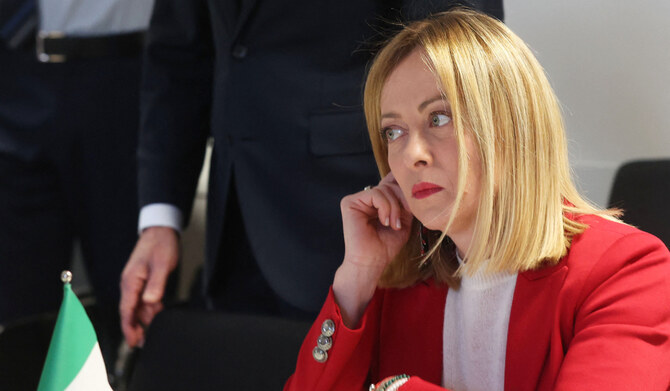ROME: Italian Prime Minister Giorgia Meloni finds herself playing a political balancing act as Europe moves to bolster its defenses.
A nationalist with deep admiration for US President Donald Trump, she is battling to reconcile the growing gulf between her ideological instincts, which lie with Washington, and Italy’s strategic ties to the European Union, analysts say.
Meloni was the only EU leader to attend Trump’s inauguration in January and has carefully steered clear of any criticism of the US president, even as he has hit Europe with tariffs and threatened to abandon Ukraine in its war with Russia.
While she has taken part in emergency talks with European partners on how to navigate the upheavals caused by Trump’s foreign policy, her engagement at times has seemed unenthusiastic, prompting critics at home to accuse her of isolating Italy within the EU.
Meloni, who has been in power since 2023, dismissed suggestions that she was under the sway of Trump as she headed into a summit of European leaders this week.
“I don’t blindly follow either Europe or the United States ... I am in Europe because Italy is in Europe, so it’s not like we’re thinking of going somewhere else, but I also want the West to be compact,” she told parliament.
Ever since Meloni founded her Brothers of Italy group in 2012, she has placed close ties with the United States at the heart of her foreign policy, while watering down initial, fierce euroskepticism.
Trump’s strong-arm tactics with old allies as he looks to enhance American power has wrong-footed pro-Atlanticists, while forcing Europe to hastily review its geopolitical options and shore up its defenses.
The turmoil has put on hold Meloni’s hopes of serving as a bridge between Europe and the White House, with Europe’s two nuclear powers France and Britain taking the lead in forging a response to Trump, while Germany grabs headlines with plans for a huge spending splurge to scale up its military.
“Right now, Meloni does not have the leverage to play a mediating role with Trump,” said Giovanni Orsina, a politics professor at Rome’s Luiss University.
“If Trumpism enters a second, more constructive phase, she might be able to play a role, leveraging political and personal affinities.”
Defense budget
Meloni last month called for an “immediate summit” between the US and its allies after Trump lambasted Ukrainian President Volodymyr Zelensky in the White House, but Washington ignored her appeal.
Sources in Meloni’s office, who declined to be named, said the Italian leader was seeking a meeting with Trump later in March or early April, when the European Union is due to impose counter tariffs on 26 billion euros ($28 billion) worth of US goods in response to US tariffs on steel and aluminum.
In her address to parliament this week, Meloni questioned the wisdom of retaliatory tariffs and urged Europe to continue its military cooperation with the United States inside NATO.
Spooked by Trump’s suggestion he might not defend NATO members in future, the European Commission has laid out plans to boost the bloc’s military spending by 800 billion euros ($869 billion), while France has offered to consider extending its nuclear umbrella to European allies.


























